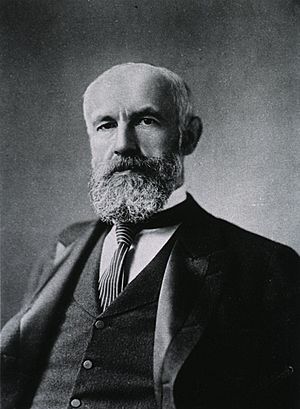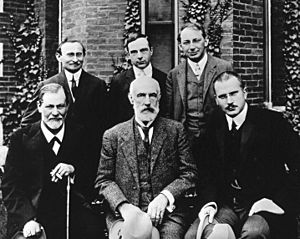G. Stanley Hall facts for kids
Quick facts for kids
G. Stanley Hall
|
|
|---|---|

Granville Stanley Hall by Frederick Gutekunst, circa 1910
|
|
| Born |
Granville Stanley Hall
February 1, 1846 Ashfield, Massachusetts, U.S.
|
| Died | April 24, 1924 (aged 78) |
| Nationality | American |
| Alma mater |
|
| Scientific career | |
| Fields | Psychologist |
| Institutions | |
| Doctoral advisor | William James |
| Doctoral students | William Lowe Bryan, Frederic Lister Burk |
| Signature | |
Granville Stanley Hall (born February 1, 1846 – died April 24, 1924) was a very important American psychologist and educator. He was the first person in the United States to earn a special degree called a doctorate in psychology. This happened at Harvard College in the 1800s.
Hall was very interested in how people grow and change throughout their lives. He also studied how humans developed over time, like in evolution. He became the first president of the American Psychological Association. This is a big group for psychologists. He was also the first president of Clark University. A study in 2002 showed that Hall was one of the most mentioned psychologists of the 20th century.
Contents
About Stanley Hall
His Early Life
Granville Stanley Hall was born in a town called Ashfield, Massachusetts. He grew up on a farm. His dad, Granville Bascom Hall, worked in the Massachusetts government. His mom, Abigail Beals, was a teacher.
As a child, Hall loved to read. He learned a lot from his parents and local schools. He was also interested in animals and being active. When he was only 16, he started teaching other students. Many of them were older than him!
His Education and First Jobs
Hall went to Williams College and finished in 1867. Then he studied at the Union Theological Seminary. He was inspired by a book about how the mind and body work together. This led him to study at Harvard University. There, he met William James, who taught the first psychology class in America.
In 1878, Hall earned the first psychology doctorate in the U.S. After that, he couldn't find a job in psychology. So, he went to Europe to study more. He spent some time in a famous psychology lab in Germany.
He started his career teaching English and philosophy. He also taught history at Williams College. Later, he gave popular talks at Harvard and Johns Hopkins University. This helped him get a job at Johns Hopkins. He taught psychology there from 1882 to 1888. In 1883, he started what many consider the first official psychology lab in America.
Hall believed that high schools should focus on helping teenagers grow. He thought they shouldn't just prepare students for college. He felt high school should teach more about life skills than just traditional subjects like Latin or math.
His Later Career in Psychology
In 1887, Hall started a science magazine called the American Journal of Psychology. In 1892, he became the first president of the American Psychological Association. This was a very important role.
In 1889, he became the first president of Clark University. He stayed in this job until 1920. During his time there, he helped develop educational psychology. This field studies how people learn and how to teach them better. He also tried to understand how being a teenager affects learning.
A famous event happened in 1909. Hall invited Sigmund Freud and Carl Jung to give talks at Clark University. This was Freud's first and only visit to America. Hall even promised Freud an honorary degree from the university.

Hall was very influenced by Charles Darwin's theory of evolution. He also liked Ernst Haeckel's idea that children's development copies the development of human species over time. These ideas made Hall study how children grow. He wanted to see if human behavior was passed down through genetics.
Hall believed that education could help children develop faster. He thought it could help them reach modern thinking skills more quickly. He also studied how boys and girls were different. He thought boys and girls should go to separate schools during their teenage years. He believed this would help them grow into their gender roles. For example, girls could learn about motherhood, and boys could learn to be leaders.
Hall also wrote a book about aging in 1922, when he was 78 years old. It was called Senescence. He talked about how older people are often left out of society. He believed that older people have valuable wisdom to share. He thought they should be more involved in their communities.
Hall is also known for creating the words for different kinds of tickling. These are knismesis (light, feather-like tickling) and gargalesis (harder tickling that makes you laugh).
Hall is remembered for helping psychology grow in the United States. He also helped many students who went on to become important psychologists. One of his students was Francis Cecil Sumner, the first African American to get a PhD in psychology in 1920.
His Ideas and Views
Social Views
Hall was one of the people who started the "child-study movement" in the 1880s. He believed that children develop in a way that reflects human evolution. He thought that young children were like "savages." Because of this, he felt that trying to reason with them was a waste of time. He believed children needed to learn to fear God, love their country, and be strong.
Hall also helped make the phrase "storm and stress" popular. This phrase describes the teenage years. It means that teenagers might have conflicts with their parents, mood changes, and take more risks. While not all teenagers experience this, it is more common during adolescence than at other ages.
Hall had some strong views about only children. He supervised a study in 1896 that said only children might have trouble fitting in. He even claimed, "Being an only child is a disease in itself." This idea was spread for many years, but modern research shows that only children are just as well-adjusted as those with siblings.
Religious Views
Hall was interested in the psychology of religion. He grew up with a very religious mother. He joined a church in college and taught Bible classes. He once said that the best choice a person can make is to serve God.
He later studied different religions. He worked for a missionary group and went to many different types of religious services. After finishing his studies, he worked at a small church for a short time. Hall believed that religion helped people find their true place in the world. He later taught religious psychology at Johns Hopkins and Clark University.
His Writings
Hall wrote many important things about education. He started and edited the American Journal of Psychology. He also edited other magazines like the Pedagogical Seminary and the Journal of Race Development.
From his student days until he died, Hall was interested in philosophy, psychology, education, and religion. He focused on different areas at different times in his life. In his early career, he studied general psychology and education. Later, he focused on the details of human life, especially children and teenagers. In his last years, he thought more about people's emotions, ethics, and religious lives.
His Legacy
Hall made many important contributions to understanding how teenagers develop. He noticed that boys often become more adventurous and aggressive during their teenage years. He also saw an increase in crime rates during these years. He pointed out two types of aggression:
- Relational aggression: This includes gossiping, spreading rumors, and leaving others out. Hall noted this happens more often with girls.
- Physical aggression: This involves hitting or fighting. Hall noted this happens more often with boys.
Hall's biggest impact was helping psychology become a recognized field of study in the United States. He started the first psychology journal in the U.S. and was the first president of the American Psychological Association. His efforts paved the way for many other psychologists to follow. Without him, psychology might have taken much longer to become a respected science in America.
A ship from World War II was named in his honor: the SS Granville S. Hall.
His Family Life
Hall was married two times. His first wife was Cornelia Fisher. They got married in September 1879 and had two children: Robert Granville Hall (born in 1881) and Julia Fisher Hall (born in 1882).
His second wife was Florence E. Smith. They married in July 1899.
Granville Stanley Hall passed away on April 24, 1924, in Worcester, Massachusetts.
See also
 In Spanish: Stanley Hall para niños
In Spanish: Stanley Hall para niños
 | George Robert Carruthers |
 | Patricia Bath |
 | Jan Ernst Matzeliger |
 | Alexander Miles |

